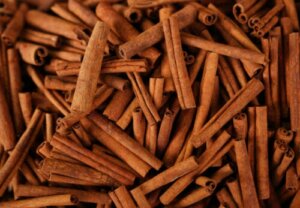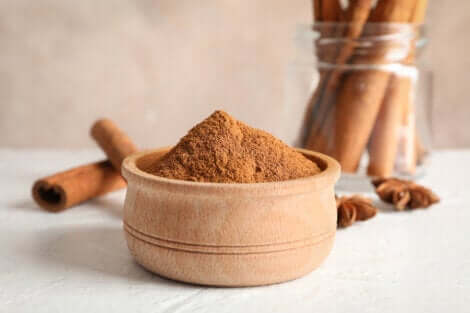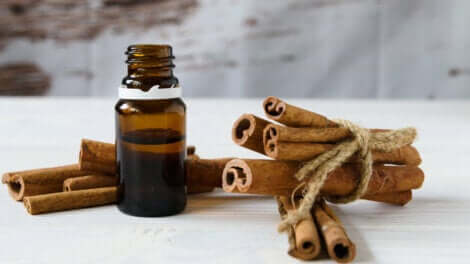Cinnamon: Its Aphrodisiac Effect and So Much More

Cinnamon is a spice that people use regularly in cooking to flavor various preparations. However, it’s also been used as a natural aphrodisiac in the popular sphere.
Some compounds cinnamon contain are believed to help increase libido and improve blood circulation and, in a way, contribute to the prevention of erectile dysfunction. Due to such attributions, various investigations have been conducted to discover how accurate these beliefs may be.
Cinnamon as an aphrodisiac
The experts of the Spanish Nutrition Foundation indicate that cinnamon contains proteins, iron, calcium, zinc, potassium, selenium, vitamins B6, C, phenols, and aldehydes. On the other hand, it’s been confirmed that it has anti-inflammatory and antioxidant properties, which benefit health even at the sexual level.

For this reason, if people who like cinnamon find its flavor and aroma pleasant, in an intimate encounter, these sensations can be amplified and make interaction even more intense.
In a study conducted in male rodents, the effect of extracts of Cinnamomum cassia (which is the cinnamon people commonly use) on the sexual function of these rodents was evaluated. The researchers concluded that it did improve it. Positive effects were also seen in other studies conducted in female rodents.
In another study, researchers concluded that one of the compounds in cinnamon essential oil helps relax muscles and improve erectile function. For this reason, they consider that it could be very useful in the case of men over 40-45 years old with erectile dysfunction.
Cinnamon is known to be a natural stimulant. This can benefit some brain functions, such as memory. However, it can also be useful in the sexual sphere.
In women
Through its aroma, it boosts libido in men and women. Therefore, the use of aromatic candles or cinnamon oil with honey is useful to increase sexual desire in sexual partners.
At the moment, no studies have studided this aspect. However, that doesn’t rule out that they can be conducted in the future.

In men
In the case of men, consuming cinnamon tea regularly increases testosterone levels. Also, due to its blood supply capacity, it favors erections. This is because, by pumping a greater amount of blood, it prolongs them.
Likewise, it can be a supplement against mild erectile dysfunction. In case of impotence, experts recommend consuming it three times a day. However, in these cases, it’s best to visit a specialist.
In sexuality
On the other hand, you have to bear in mind that cinnamon can also help relax. In some cases, stress also affects sexual desire.
In short, you should know that a cinnamon infusion helps improve mood, reduce fatigue, and activate the body. Thus, it favors sexuality in general.
This article can be useful: Sexuality in Old Age: What Happens?
Should you consume cinnamon to have a good sex life?
No study indicates that consuming cinnamon (on its own) can help you enjoy a good sex life. However, some people have been encouraged to include it in their life in various ways to feel sexier.
For example, as we mentioned above, some people place scented cinnamon candles in their rooms when they want to create a more cozy and intimate atmosphere when they’re going to have sex with their partner or to neutralize other smells.

On the other hand, some people apply lotions or creams that contain cinnamon to have a more pleasant and attractive body odor. Other people drink cinnamon tea during Christmas or add this spice to their cocktails, coffee, or teas.
Whichever option you choose, you must bear in mind that cinnamon may be contraindicated in some cases. For example, it isn’t recommended for pregnant women or for people with clotting problems.
It’s important to take into account the contraindications to avoid putting your health at risk.
All cited sources were thoroughly reviewed by our team to ensure their quality, reliability, currency, and validity. The bibliography of this article was considered reliable and of academic or scientific accuracy.
- Gruenwald, J., Freder, J., & Armbruester, N. (2010). Cinnamon and health. Critical Reviews in Food Science and Nutrition. https://doi.org/10.1080/10408390902773052
- Mang, B., Wolters, M., Schmitt, B., Kelb, K., Lichtinghagen, R., Stichtenoth, D. O., & Hahn, A. (2006). Effects of a cinnamon extract on plasma glucose, HbA1c, and serum lipids in diabetes mellitus type 2. European Journal of Clinical Investigation. https://doi.org/10.1111/j.1365-2362.2006.01629.x
- Rao, P. V., & Gan, S. H. (2014). Cinnamon: A multifaceted medicinal plant. Evidence-Based Complementary and Alternative Medicine. https://doi.org/10.1155/2014/642942
This text is provided for informational purposes only and does not replace consultation with a professional. If in doubt, consult your specialist.








